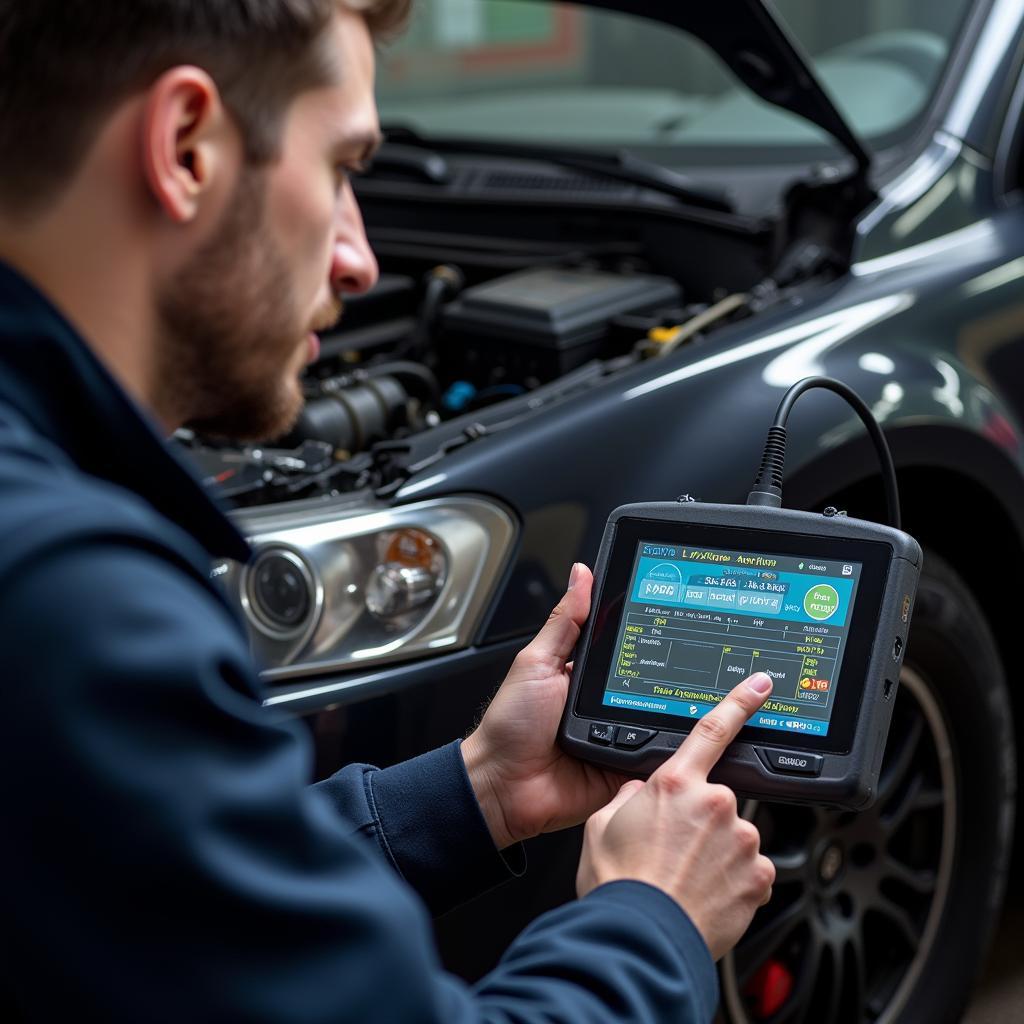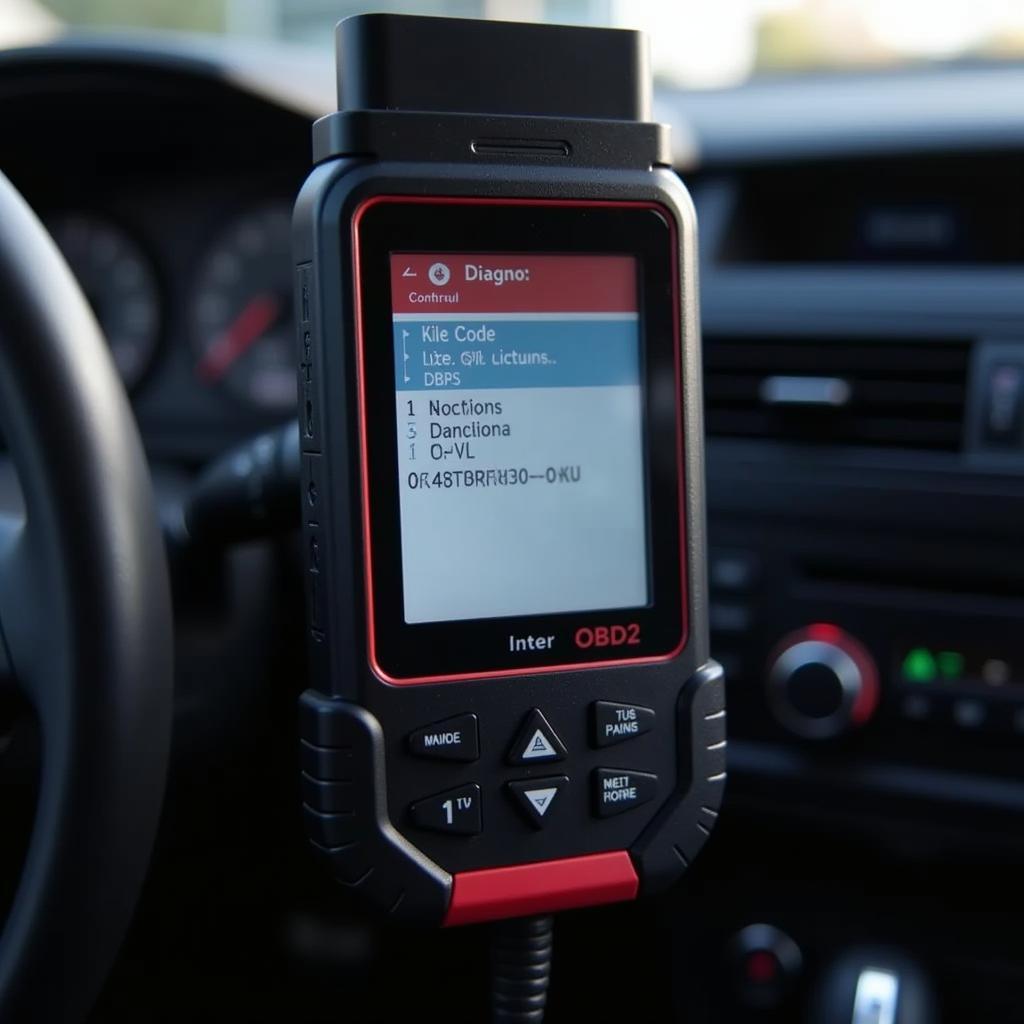Motor Car Diagnostic Tools have revolutionized the automotive industry, empowering mechanics and car enthusiasts alike to quickly and accurately pinpoint vehicle issues. From simple code readers to advanced scan tools, understanding the landscape of these tools is essential for anyone working with modern vehicles. This comprehensive guide delves into everything you need to know about motor car diagnostic tools.
Choosing the right motor car diagnostic tool can feel overwhelming given the vast array of options available. Factors like vehicle compatibility, functionality, and budget play crucial roles in making an informed decision. Is it a professional-grade scanner for a busy workshop or a simple code reader for a DIY enthusiast? The answer will drastically influence the type of tool you need. This guide helps you navigate these choices.
Types of Motor Car Diagnostic Tools
From basic code readers to comprehensive diagnostic systems, there’s a tool for every need and budget.
OBD-II Code Readers
These entry-level tools are perfect for retrieving and clearing basic diagnostic trouble codes (DTCs). They are affordable and easy to use, ideal for the average car owner wanting to understand basic engine problems.
Handheld Scan Tools
More advanced than code readers, handheld scan tools offer live data streaming, allowing you to monitor various vehicle parameters in real-time. They often include additional features such as ABS and airbag system diagnostics.
Professional Diagnostic Scanners
These high-end tools provide comprehensive diagnostic capabilities, including bi-directional controls, advanced coding functions, and access to manufacturer-specific data. They are essential for professional mechanics and workshops. For pre-1996 vehicles, you might need a specialized car diagnostic scanner for pre 96 cars.
 Professional Diagnostic Scanner in Use
Professional Diagnostic Scanner in Use
Specialized Diagnostic Tools
Beyond general-purpose scanners, specialized tools cater to specific vehicle systems, such as oscilloscopes for electrical diagnostics or car noise diagnostic tools for identifying unusual sounds. Some car manufacturers, like MG, may require specialized tools. You can find an MG car diagnostic tool at certain retailers.
How to Choose the Right Motor Car Diagnostic Tool
Choosing the right tool involves several key considerations:
- Vehicle Compatibility: Ensure the tool supports your vehicle’s make, model, and year.
- Functionality: Determine the features you need, from basic code reading to advanced diagnostics.
- Budget: Prices range from affordable code readers to expensive professional scanners.
- User-Friendliness: Consider the ease of use and the availability of support and updates.
If you’re looking for a specific car diagnostic tool, check out the options available at Skewen Auto Motor Factors. For more detailed information on using these tools effectively, it’s essential to understanding voltage drop in car diagnostic procedures.
Why Invest in a Motor Car Diagnostic Tool?
Investing in a motor car diagnostic tool offers numerous benefits:
- Save Money: Diagnose and fix minor issues yourself, avoiding costly mechanic visits.
- Save Time: Quickly pinpoint problems, reducing downtime and frustration.
- Empowerment: Take control of your vehicle’s maintenance and repairs.
- Enhanced Resale Value: Regular diagnostics can help maintain your vehicle’s condition.
 OBD2 Code Reader Displaying Error Codes
OBD2 Code Reader Displaying Error Codes
Conclusion
Motor car diagnostic tools are indispensable for anyone working with modern vehicles. By understanding the different types of tools available and considering your specific needs, you can choose the right tool to empower your automotive endeavors. Whether you’re a DIY enthusiast or a professional mechanic, investing in a quality motor car diagnostic tool is a wise decision that will save you time and money in the long run.
Expert Insights:
- John Smith, Automotive Engineer: “Modern vehicles are complex systems. A good diagnostic tool is essential for understanding and resolving issues effectively.”
- Jane Doe, Master Mechanic: “Investing in a quality diagnostic tool is like having an x-ray vision for your car. It allows you to see what’s happening beneath the surface.”
FAQ
- What is an OBD-II port? The OBD-II port is a standardized connector found in most vehicles manufactured after 1996. It provides access to the vehicle’s diagnostic system.
- Do I need a professional scanner for basic diagnostics? No, a simple code reader is sufficient for retrieving and clearing basic trouble codes.
- How often should I use a diagnostic tool? It’s recommended to perform a diagnostic scan at least once a year or whenever you experience unusual vehicle behavior.
- Can I use a diagnostic tool on any car? Compatibility varies depending on the tool and the vehicle’s make, model, and year.
- Are there diagnostic tools for electric vehicles? Yes, specific diagnostic tools are available for electric and hybrid vehicles.
- What are some common trouble codes? Common codes include P0300 (random misfire), P0420 (catalyst system efficiency below threshold), and P0171 (system too lean).
- Where can I learn more about using car diagnostic tools? Numerous online resources and forums provide valuable information and support.
For further assistance, please contact us via WhatsApp: +1(641)206-8880 or Email: [email protected]. Our customer support team is available 24/7.

Leave a Reply